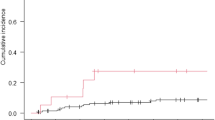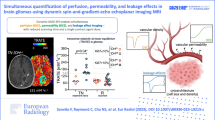Abstract
We tested the hypothesis that intra-arterial (IA) infusion of temozolomide into the internal carotid artery would safely improve drug delivery to brain and enhance chemotherapy efficacy in a chemosensitive rat brain tumor model. Quantitative autoradiography after 25 µCi 14C-temozolomide was given by oral, intravenous, or IA route of administration, or IA with osmotic blood–brain barrier disruption (BBBD) (n = 5–7 per group) showed that both IA and IA/BBBD administration increased drug delivery in tumor by over threefold compared to normal brain (P < 0.02), and also significantly elevated delivery throughout the infused right hemisphere. Temozolomide (20 mg/kg; ~150 mg/m2) increased median survival when given by oral (25.5 days), intravenous (25.5 days), or IA (33 days) route of administration, compared to 17.5 days in untreated controls (n = 8 per group; overall P < 0.0001). Survival time after IA temozolomide was significantly longer than all other groups (P < 0.01 for all comparisons). BBBD temozolomide was toxic in the efficacy study, but there was no evidence of symptomatic neurotoxicity in rats given IA temozolomide. After these promising animal results, a 49 year old male with glioblastoma multiforme who failed all standard therapy received temozolomide 100 mg/m2 IA. Upon initiation of the second course of IA infusion the patient had increased heart rate, blood pressure, and rash, and the procedure was terminated without sequelae. Follow up IA infusion of temozolomide diluent in normal rats showed damaged cerebrovasculature as determined by dye leakage. These results demonstrate that IA infusion of temozolomide was toxic, with or without BBBD. We conclude that under the current formulation temozolomide is not safe for IA infusion in patients.



Similar content being viewed by others
References
Stupp R, Mason WP, van den Bent MJ, Weller M, Fisher B, Taphoorn MJ, Belanger K, Brandes AA, Marosi C, Bogdahn U, Curschmann J, Janzer RC, Ludwin SK, Gorlia T, Allgeier A, Lacombe D, Cairncross J, Eisenhauer E, Mirimanoff RO (2005) Radiotherapy plus concomitant and adjuvant temozolomide for glioblastoma. N Engl J Med 352:987–996
Gahramanov S, Muldoon LL, Varallyay CG, Li X, Kraemer DF, Fu R, Hamilton BE, Rooney WD, Neuwelt EA (2013) Pseudoprogression of glioblastoma after chemo- and radiation therapy: diagnosis by using dynamic susceptibility-weighted contrast-enhanced perfusion MR imaging with ferumoxytol versus gadoteridol and correlation with survival. Radiology 266:842–852. doi:10.1148/radiol.12111472
Abrey LE, Christodoulou C (2001) Temozolomide for treating brain metastases. Seminars Oncol 28:34–42
Wang Q, Jiang Z, Qi X, Lu S, Wang S, Leng C, Lu F, Liu HL, Liang S, Shi J (2014) Whole brain radiation therapy followed by intensity-modulated boosting treatment combined with concomitant temozolomide for brain metastases from non-small-cell lung cancer. Clin Transl Oncol 16:1000–1005
Portnow J, Badie B, Chen M, Liu A, Blanchard S, Synold TW (2009) The neuropharmacokinetics of temozolomide in patients with resectable brain tumors: potential implications for the current approach to chemoradiation. Clin Cancer Res 15:7092–7098
Grossman R, Rudek MA, Brastianos H, Zadnik P, Brem H, Tyler B, Blakeley JO (2012) The impact of bevacizumab on temozolomide concentrations in intracranial U87 gliomas. Cancer Chemother Pharmacol 70:129–139
Muldoon LL, Soussain C, Jahnke K, Johanson C, Siegal T, Smith QR, Hall W, Hynynen K, Senter P, Peereboom DM, Neuwelt EA (2007) Chemotherapy delivery issues in central nervous system malignancy: a reality check. J Clinical Oncol 25:2295–2305
Azad TD, Pan J, Connolly ID, Remington A, Wilson CM, Grant GA (2015) Therapeutic strategies to improve drug delivery across the blood–brain barrier. Neurosurg Focus 38:E9
Theodotou C, Shah AH, Hayes S, Bregy A, Johnson JN, Aziz-Sultan MA, Komotar RJ (2014) The role of intra-arterial chemotherapy as an adjuvant treatment for glioblastoma. Br J Neurosurg 28:438–446
Doolittle ND, Miner ME, Hall WA, Siegal T, Hanson EJ, Osztie E, McAllister LD, Bubalo JS, Kraemer DF, Fortin D, Nixon R, Muldoon LL, Neuwelt EA (2000) Safety and efficacy of a multi-center study using intraarterial chemotherapy in conjunction with osmotic opening of the blood–brain barrier for the treatment of malignant brain tumors. Cancer 88:637–647
Doolittle ND, Muldoon LL, Culp AY, Neuwelt EA (2014) Delivery of chemotherapeutics across the blood–brain barrier: challenges and advances. Adv Pharmacol 71:203–243. doi:10.1016/bs.apha.2014.06.002
Angelov L, Doolittle ND, Kraemer DF, Siegal T, Barnett GH, Peereboom DM, Stevens G, McGergor J, Jahnke K, Lacy CA, Hedrick NA, Shalom E, Ference S, Bell S, Sorenson L, Tyson RM, Haluska M, Neuwelt EA (2009) Blood–brain barrier disruption and intra-arterial methotrexate-based therapy for newly diagnosed primary CNS lymphoma: a multi-institutional experience. J Clinical Oncol 27:3503–3509
Neuwelt EA, Pagel MA, Kraemer DF, Peterson DR, Muldoon LL (2004) Bone marrow chemoprotection without compromise of chemotherapy efficacy in a rat brain tumor model. J Pharmacol Exp Ther 309:594–599
Silbergeld DL, Chicoine MR (1997) Isolation and characterization of human malignant glioma cells from histologically normal brain. J Neurosurg Pediatr 86:525–531
Imbesi F, Marchioni E, Benericetti E, Zappoli F, Galli A, Corato M, Ceroni M (2006) A randomized phase III study: comparison between intravenous and intraarterial ACNU administration in newly diagnosed primary glioblastomas. Anticancer Res 26:553–558
Zhou Q, Gallo JM (2009) Differential effect of sunitinib on the distribution of temozolomide in an orthotopic glioma model. Neuro Oncol 11:301–310
Doolittle ND, Korfel A, Lubow MA, Schorb E, Schlegel U, Rogowski S, Fu R, Dosa E, Illerhaus G, Kraemer DF, Muldoon LL, Calabrese P, Hedrick NA, Tyson RM, Jahnke K, Maron LM, Butler RW, Neuwelt EA (2013) Long-term cognitive function, neuroimaging, and quality of life in primary CNS lymphoma. Neurology 81:84–92. doi:10.1212/WNL.0b013e318297eeba
Fortin D, Morin PA, Belzile F, Mathieu D, Paré FM (2014) Intra-arterial carboplatin as a salvage strategy in the treatment of recurrent glioblastoma multiforme. J Neurooncol 119:397–403
Mathieu V, De Neve N, Le Mercier M, Dewelle J, Gaussin JF, Dehoux M, Kiss R, Lefranc F (2008) Combining bevacizumab with temozolomide increases the antitumor efficacy of temozolomide in a human glioblastoma orthotopic xenograft model. Neoplasia 10:1383–1392
Pishko GL, Muldoon LL, Pagel MA, Schwartz DL, Neuwelt EA (2015) Vascular endothelial growth factor blockade alters magnetic resonance imaging biomarkers of vascular function and decreases barrier permeability in a rat model of lung cancer brain metastasis. Fluids Barriers CNS 12:5. doi:10.1186/2045-8118-12-5
Liu HL, Huang CY, Chen JY, Wang HY, Chen PY, Wei KC (2014) Pharmacodynamic and therapeutic investigation of focused ultrasound-induced blood–brain barrier opening for enhanced temozolomide delivery in glioma treatment. PLoS ONE 9:e114311
Fan CH, Ting CY, Chang YC, Wei KC, Liu HL, Yeh CK (2015) Drug-loaded bubbles with matched focused ultrasound excitation for concurrent blood–brain barrier opening and brain-tumor drug delivery. Acta Biomater 15:89–101
Bernal GM, LaRiviere MJ, Mansour N, Pytel P, Cahill KE, Voce DJ, Kang S, Spretz R, Welp U, Noriega SE, Nunez L, Larsen G, Weichselbaum RR, Yamini B (2014) Convection-enhanced delivery and in vivo imaging of polymeric nanoparticles for the treatment of malignant glioma. Nanomedicine 10:149–157
Joshi S, Singh-Moon RP, Wang M, Chaudhuri DB, Holcomb M, Straubinger NL, Bruce JN, Bigio IJ, Straubinger RM (2014) Transient cerebral hypoperfusion assisted intraarterial cationic liposome delivery to brain tissue. J Neurooncol 118:73–82
Kunwar S, Chang S, Westphal M, Vogelbaum M, Sampson J, Barnett G, Shaffrey M, Ram Z, Piepmeier J, Prados M, Croteau D, Pedain C, Leland P, Husain SR, Joshi BH, Puri RK (2010) Phase III randomized trial of CED of IL13-PE38QQR vs Gliadel wafers for recurrent glioblastoma. Neuro Oncol 12:871–881
Newton HB (2012) Neurological complications of chemotherapy to the central nervous system. Handb Clin Neurol 105:903–916
Soffietti R, Trevisan E, Rudà R (2014) Neurologic complications of chemotherapy and other newer and experimental approaches. Handb Clin Neurol 121:1199–1218
Lin F, de Gooijer MC, Roig EM, Buil LC, Christnerm SM, Beumer JH, Würdinger T, Beijnen JH, van Tellingen O (2014) ABCB1, ABCG2, and PTEN determine the response of glioblastoma to temozolomide and ABT-888 therapy. Clin Cancer Res 20:2703–2713
Candolfi M, Yagiz K, Wibowo M, Ahlzadeh GE, Puntel M, Ghiasi H, Kamran N, Paran C, Lowenstein PR, Castro MG (2014) Temozolomide does not impair gene therapy-mediated antitumor immunity in syngeneic brain tumor models. Clin Cancer Res 20:1555–1565
Shin BJ, Burkhardt JK, Riina HA, Boockvar JA (2012) Superselective intra-arterial cerebral infusion of novel agents after blood–brain disruption for the treatment of recurrent glioblastoma multiforme: a technical case series. Neurosurg Clin N Am 23:323–329
Funding
This work was supported by a Veterans Administration Merit Review grant; the National Institutes of Health National Cancer Institute grant CA137488; National Institute of Neurological Diseases and Stroke grant NS44687; and the Walter S. and Lucienne Driskill Foundation, all to Edward A. Neuwelt.
Author information
Authors and Affiliations
Corresponding author
Rights and permissions
About this article
Cite this article
Muldoon, L.L., Pagel, M.A., Netto, J.P. et al. Intra-arterial administration improves temozolomide delivery and efficacy in a model of intracerebral metastasis, but has unexpected brain toxicity. J Neurooncol 126, 447–454 (2016). https://doi.org/10.1007/s11060-015-2000-1
Received:
Accepted:
Published:
Issue Date:
DOI: https://doi.org/10.1007/s11060-015-2000-1




